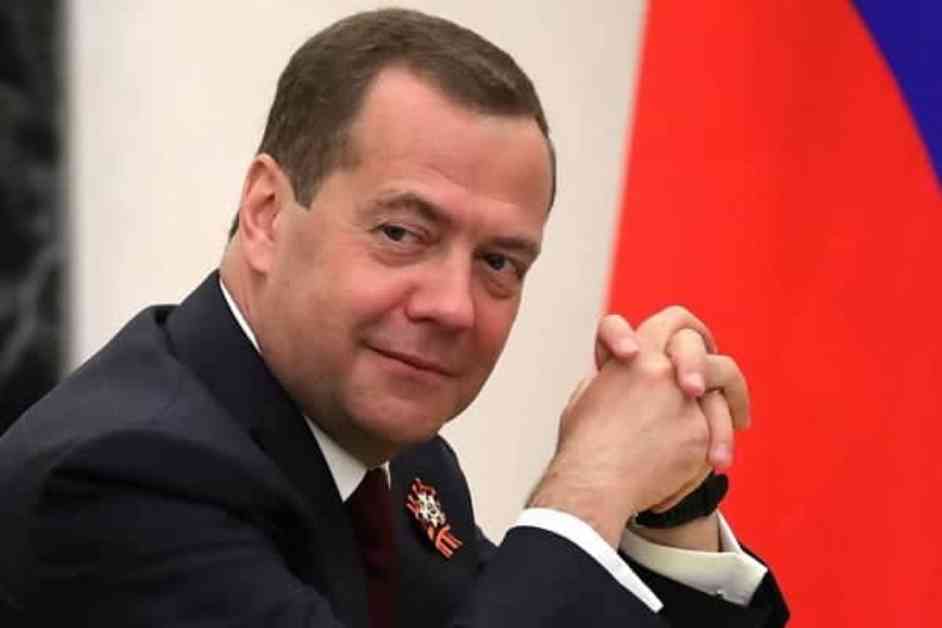A high-ranking Russian official has issued a stark warning to Ukraine, cautioning that the use of long-range Storm Shadow cruise missiles inside Russian territory could result in the deployment of non-nuclear weapons. Dmitry Medvedev, the deputy chairman of the Security Council of Russia and former President, expressed his strong displeasure over Ukraine’s alleged missile activities within Russia. Medvedev suggested that Russia could potentially resort to the use of nuclear weapons in response to Ukraine’s actions in the Kursk region.
The tensions between Russia and Ukraine have escalated significantly, with Medvedev indicating that Russia possesses advanced technologies capable of transforming the Ukrainian capital, Kyiv, into a “giant melted spot” if provoked further. Medvedev’s remarks underscore the growing concerns over the potential for military conflict between the two countries, as Ukraine reportedly obtained permission to strike military targets deep inside Russia with Storm Shadow cruise missiles, according to sources cited by The Guardian.
In a recent statement, Medvedev criticized the British Foreign Secretary’s pledge of “100 years of support” to Ukraine, dismissing the claim as false and asserting that Ukraine’s existence may be short-lived. He also issued a veiled warning to the United Kingdom, suggesting that the island nation could face dire consequences in the near future. The escalating rhetoric from Russian officials reflects the heightened tensions in the region, as Western powers consider providing military assistance to Ukraine in its conflict with Russia.
Escalating Tensions: Ukraine’s Use of Long-Range Missiles
The prospect of Ukraine employing long-range Storm Shadow cruise missiles against Russian targets has raised concerns about the potential for a full-scale conflict between the two nations. The strategic implications of such a move could have far-reaching consequences, as Russia has signaled its readiness to respond forcefully to any perceived threats to its sovereignty. The deployment of advanced missile systems by Ukraine represents a significant escalation in the ongoing conflict, further exacerbating the already tense relations between the two countries.
The granting of permission to Kyiv to use long-range missiles inside Russian territory has underscored the deepening rift between Russia and Western powers, with the US and UK reportedly endorsing Ukraine’s military actions. The decision to allow Ukraine to target Russian military installations with precision strikes reflects the evolving dynamics of the conflict, as Western nations seek to bolster Ukraine’s defense capabilities against Russian aggression. The strategic calculus of such a move remains complex, with potential implications for the broader security landscape in Europe.
International Response: NATO’s Role in the Conflict
The involvement of NATO in the conflict between Russia and Ukraine has raised concerns about the potential for a wider military confrontation in the region. The alliance’s support for Ukraine’s use of long-range missiles against Russian targets has drawn sharp rebukes from Moscow, with Russian President Vladimir Putin warning of dire consequences if NATO crosses a new “red line.” The specter of direct military engagement between NATO countries and Russia has cast a shadow over the already volatile situation, prompting calls for de-escalation and diplomatic resolution.
The recent meeting between US President Joe Biden and British Prime Minister Keir Starmer highlighted the transatlantic alliance’s commitment to supporting Ukraine in its struggle against Russian aggression. Biden’s reassurances that Ukraine’s use of Storm Shadow cruise missiles does not constitute NATO’s involvement in a war with Russia reflect the delicate balancing act of Western powers in the region. The need to prevent further escalation while deterring Russian aggression remains a pressing challenge for the international community, as the conflict in Eastern Europe continues to unfold.
Geopolitical Implications: The Future of the Conflict
The evolving dynamics of the conflict between Russia and Ukraine have far-reaching geopolitical implications for the broader security landscape in Europe. The prospect of a direct military confrontation between NATO countries and Russia poses significant risks to regional stability, with the potential for a wider conflict drawing closer. The strategic calculations of both sides in the conflict will shape the course of events in the coming days and weeks, as tensions continue to escalate on the ground.
The escalation of hostilities in Eastern Europe underscores the fragility of the security situation in the region, as competing interests and strategic calculations drive the actions of key players. The specter of nuclear escalation looms large over the conflict, with the potential for miscalculation or misinterpretation of intentions leading to catastrophic outcomes. The need for diplomatic engagement and de-escalation measures remains paramount, as the international community grapples with the challenge of preventing a full-scale war in the heart of Europe.
In conclusion, the escalating tensions between Russia and Ukraine over the use of long-range missiles highlight the fragile security situation in Eastern Europe. The potential for a wider military confrontation between NATO countries and Russia poses significant risks to regional stability, with the specter of nuclear escalation raising concerns about the future of the conflict. The need for diplomatic engagement and de-escalation measures remains critical, as the international community navigates the complex dynamics of the crisis.

